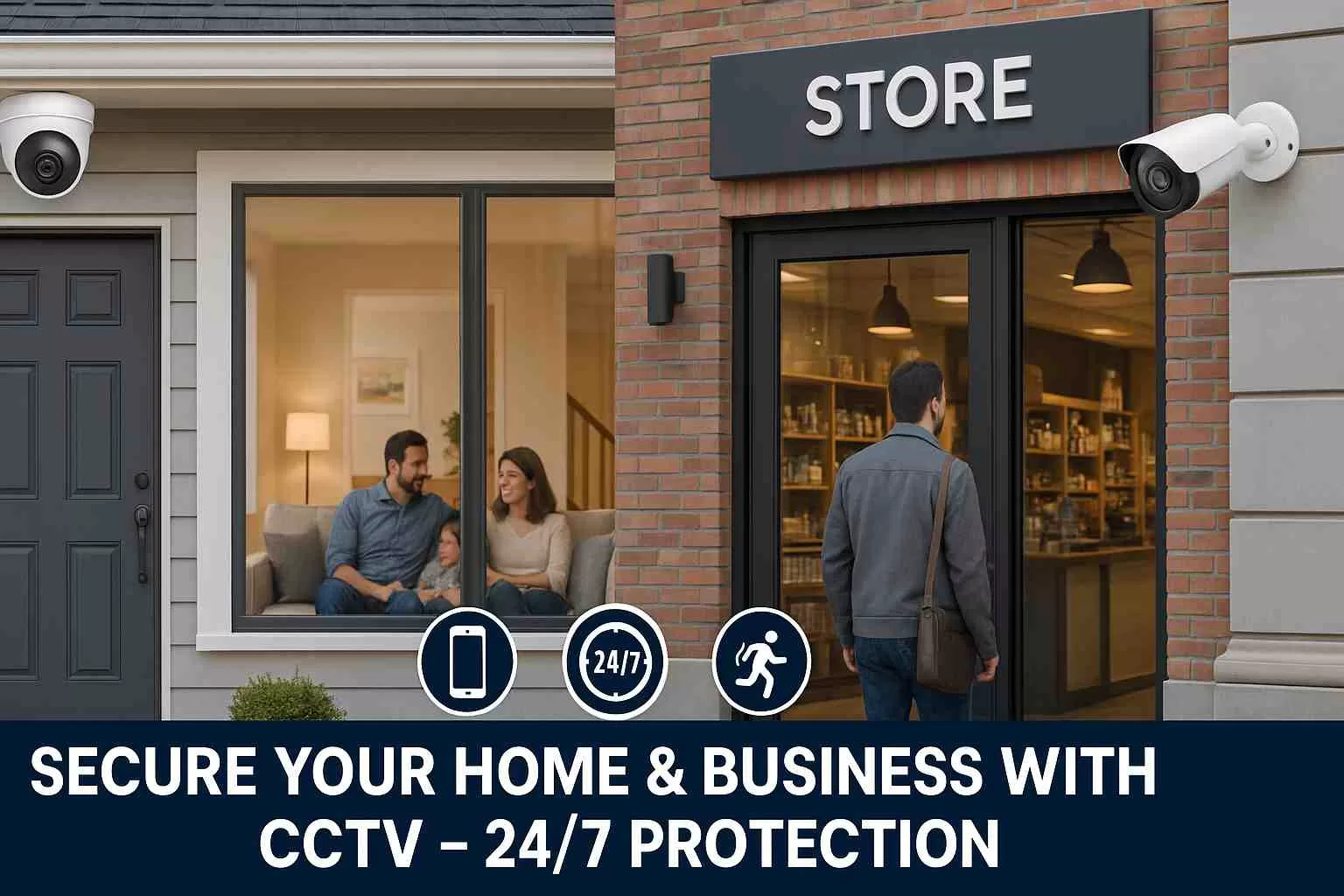
Are You Really Safe Without CCTV?
Imagine returning home after a short trip only to discover that your property has been broken into. There were no witnesses, and no evidence—except the silent story a CCTV camera could have told.
With crime rates and security threats on the rise, surveillance is no longer a luxury—it’s a necessity. Whether you’re securing a small apartment or a sprawling commercial complex, CCTV (Closed-Circuit Television) systems offer unmatched peace of mind.
In this comprehensive guide, we’ll explore why installing a CCTV system is essential , how it works, the benefits it offers, and how to choose the right one for your needs.
Table of Contents
- What is CCTV and How Does It Work?
- Top 10 Reasons Why CCTV Is a Must-Have
- Types of CCTV Cameras Explained
- Where Should You Install CCTV Cameras?
- What to Look for When Buying CCTV in 2025
- Cost of CCTV Installation and Maintenance
- Legal Guidelines and Video surveillance Usage
- Real-Life Examples of CCTV in Action
- Final Thoughts and Actionable Tips
What is CCTV and How Does It Work?
CCTV, short for Closed-Circuit Television, is a system that uses video cameras to transmit a signal to a specific, limited set of monitors. Unlike broadcast television, the feed is not publicly distributed.
CCTV systems consist of:
- Cameras (analog or digital)
- Display monitors
- Recording devices (DVRs/NVRs)
- Cables or wireless transmitters
- Power supply
These systems can operate 24/7 and are often accessible remotely through smartphones or desktops.
Top 10 Reasons Why CCTV Is a Must-Have
1. Crime Deterrence
Visible Video surveillance cameras deter criminals. A property under surveillance is far less likely to be targeted.
2. Real-Time Monitoring
Modern CCTV systems offer live-streaming via mobile apps, letting you monitor your space from anywhere.
3. Evidence Collection
Should a crime occur, footage serves as vital legal evidence for police and insurance claims.
4. Remote Access
Monitor your business or home while on vacation, at work, or even abroad.
5. Employee & Visitor Safety
Monitor staff and guests to ensure adherence to safety protocols and ethical behavior.
6. Lower Insurance Premiums
Installing CCTV often qualifies you for discounts on insurance, reducing operational costs.
7. Dispute Resolution
Resolve disputes among employees, tenants, or customers using video verification.
8. Peace of Mind
Knowing that your loved ones or assets are safe brings immense mental comfort.
9. Scalable Solutions
Start small and scale your system as your needs grow.
10. Smart Integration
Modern CCTV systems integrate with other smart devices like alarms and motion sensors.
Types of Security Cameras Explained
📷 Dome Cameras
Ideal for indoor surveillance with a wide viewing angle.
🔍 Bullet Cameras
Great for outdoor use; long-range and weatherproof.
🕹️ PTZ Cameras
Pan-Tilt-Zoom functionality enables flexible surveillance from one camera.
💡 Day/Night Cameras
Perfect for areas with varying light conditions, including night-time monitoring.
☁️ IP Cameras
High-resolution cameras that transmit data over the internet.
Explore our CCTV camera range for more details.
Where Should You Install Security Cameras?
Strategic placement enhances surveillance effectiveness. Consider:
- Main entrances and exits
- Driveways and garages
- Living rooms and hallways
- Backyards or blind spots
- Reception and cash counters (for businesses)
Always angle cameras to avoid glare and ensure maximum coverage.
What to Look for When Buying CCTV
Resolution
At least 1080p HD for clear image capture.
Storage
Look for expandable cloud or HDD storage options.
Night Vision
Essential for 24/7 monitoring, especially outdoors.
Mobile App Integration
Enables remote viewing and playback.
Motion Detection
Helps in efficient storage usage and alerts during unexpected activity.
Weather Resistance
Look for IP65 or higher for outdoor units.
Warranty and Support
Ensure strong after-sales service and technical support.
Cost of CCTV Installation and Maintenance
Prices can vary depending on the complexity of the setup:
| Type of Setup | Average Cost (INR) |
|---|---|
| Basic 2-Camera Setup | ₹8,000 – ₹15,000 |
| 4-Camera HD System | ₹18,000 – ₹30,000 |
| 8-Camera IP Setup | ₹40,000 – ₹75,000 |
| Annual Maintenance | ₹2,000 – ₹5,000 |
Factors that affect price include camera resolution, storage capacity, and installation complexity.
Legal Guidelines and CCTV Usage
CCTV installation is legal in India, but you must:
- Inform employees or tenants if cameras are installed indoors.
- Avoid installing cameras in private areas like bathrooms.
- Store data securely and restrict unauthorized access.
Refer to India’s IT Act and Privacy Laws for more.
Real-Life Examples of CCTV in Action
🔸 A retail store owner in Chennai caught a shoplifter using a motion-activated video surveillance system.
🔸 Bengaluru’s residential societies are leveraging AI-integrated CCTV to manage visitor logs and improve security.
🔸 Meanwhile, traffic police in Mumbai use CCTV to penalize violators and minimize accidents at busy intersections.
Final Thoughts and Actionable Tips
Installing a CCTV system is no longer optional—it’s a smart, future-ready investment in your safety.
Whether you own a home, run a business, or manage a facility, Video surveillance gives you eyes where you need them most.
Actionable Tips:
- Choose the right camera for your specific need.
- Hire professional installers for better coverage.
- Regularly maintain and update firmware/software.
- Use cloud backups for critical footage.
📞 Ready to Secure Your Premises?
Call us at 9150012345 or click the WhatsApp button below to get a FREE Video Surveillance Site Survey.
Read more about Access Control Systems to complement your CCTV setup.
Learn about data privacy laws on the Ministry of Electronics & IT – Government of India
Video Surveillance | CCTV Camera Prices | IR Bullet Camera

